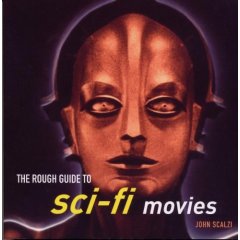A Reminder for Philadelphians, A Tease for Everyone Else
 Tomorrow night, I’ll be appearing at Germ Books + Gallery (308 E. Girard, in what I’m told is the hip Fishtown neighborhood) for a 7 p.m. event with John Scalzi, whose Rough Guide to Sci-Fi Movies I’m eagerly devouring as we speak (well, okay, not while I’m typing, but in the free moments before and after).
Tomorrow night, I’ll be appearing at Germ Books + Gallery (308 E. Girard, in what I’m told is the hip Fishtown neighborhood) for a 7 p.m. event with John Scalzi, whose Rough Guide to Sci-Fi Movies I’m eagerly devouring as we speak (well, okay, not while I’m typing, but in the free moments before and after).
As John says on his blog, “We’ll be talking specifically about science fiction films of the 70s (seeing as I’ve written a book on SF films, and he’s written a book on 70s films), but I imagine that the discussion is likely to wander afield as he and I shock and amaze the good people of Philly with our sass and wit (not to mention humility).”
25 January 2006 | events |
Patrick O’Keeffe Gets “Carried Away”
I’m launching a new essay feature on Beatrice this week, in which short story writers will be invited to comment upon their favorite short stories or short story writers. It’s called “Selling Shorts,” which is an admittedly egregious pun, and probably a bit mercenary for a bookblog, but I hope it’ll come to grow on you—and the authors will be swell, at any rate.
First off, I’ve invited Patrick O’Keeffe, whose The Hill Road is [UPDATED: the winner] of the second annual Story Prize. He graciously agreed to contribute an essay about Alice Munro’s “Carried Away,” which can be found in the collection Open Secrets.
“Take what you have gathered from coincidence”—Bob Dylan
Alice Munro, in Open Secrets, resembles Tolstoy, in that she convincingly gives you the entire social structure of a place, in her case the town of Carstairs, from top to bottom, each character from the inside out. “Carried Away,” Louisa’s story, is constructed around a set of bizarre, though plausible, coincidences. Louisa is initially a commercial traveler; she later becomes the public librarian, and receives letters from Jack Agnew, a soldier in the First World War. She sends him a photograph, falls deliriously in love with him, but when he returns from the war, he marries the dull, conventional Grace. Louisa, unlike Grace, possesses “some consciousness of herself as a heroine of love’s tragedy.” Jack, however, was engaged to Grace before he went off to the war. He sneaks books out of the library, but never approaches Louisa, whose love for a man she has never seen persists. There is an indication of mythology, of legend, to all this.
Once an outsider and a stranger in the town, Louisa, as time passes, ends up doing well for herself, because she marries Arthur Doud. The Doud family owns the piano factory, which is the town’s chief employer. One afternoon, Arthur visits the library to return Jack Agnew’s books, given to him by Jack’s wife, Grace, after Jack is beheaded in an accident with a mechanical saw in Arthur’s factory. Louisa doesn’t tell Arthur about Jack, and a new episode in both of their lives begins.
24 January 2006 | selling shorts |


 Our Endless and Proper Work is my new book with Belt Publishing about starting (and sticking to) a productive writing practice.
Our Endless and Proper Work is my new book with Belt Publishing about starting (and sticking to) a productive writing practice. 
